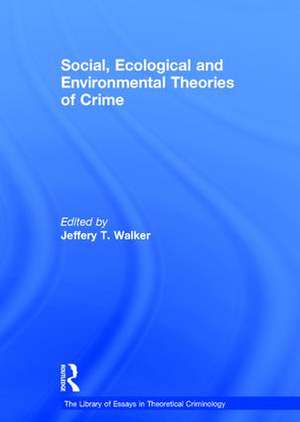Social, Ecological and Environmental Theories of Crime: The Library of Essays in Theoretical Criminology
Editat de Jeffery T. Walkeren Limba Engleză Hardback – 15 apr 2011
Preț: 1698.32 lei
Preț vechi: 2468.41 lei
-31% Nou
Puncte Express: 2547
Preț estimativ în valută:
324.98€ • 339.99$ • 269.96£
324.98€ • 339.99$ • 269.96£
Comandă specială
Livrare economică 12-26 martie
Doresc să fiu notificat când acest titlu va fi disponibil:
Se trimite...
Preluare comenzi: 021 569.72.76
Specificații
ISBN-13: 9780754628972
ISBN-10: 0754628973
Pagini: 560
Dimensiuni: 169 x 244 x 41 mm
Greutate: 1.32 kg
Ediția:1
Editura: Taylor & Francis
Colecția Routledge
Seria The Library of Essays in Theoretical Criminology
Locul publicării:Oxford, United Kingdom
ISBN-10: 0754628973
Pagini: 560
Dimensiuni: 169 x 244 x 41 mm
Greutate: 1.32 kg
Ediția:1
Editura: Taylor & Francis
Colecția Routledge
Seria The Library of Essays in Theoretical Criminology
Locul publicării:Oxford, United Kingdom
Cuprins
Contents: Introduction; Part I The Early Days - Human Ecology: The study of the delinquent as a person, Ernest W. Burgess; The ecological approach to the study of the human community, R. D. McKenzie; Human ecology, Robert Ezra Park; Ecology and human ecology, Amos H. Hawley. Part II Social Disorganization and Beyond: The neighborhood and child conduct, Henry D. McKay; Rejoinder, Clifford R. Shaw; The conflict of values in delinquency areas, Solomon Kobrin; Community structure and crime: testing social-disorganization theory, Robert J. Sampson and W. Byron Groves. Part III The Focus on Deteriorating Neighbourhoods: Dangerous places: crime and residential environment, Dennis W. Roncek; Community change and patterns of delinquency, Robert J. Bursik Jr and Jim Webb; The police and neighborhood safety: broken windows, James Q. Wilson and George L. Kelling; Neighborhood and delinquency: an assessment of contextual effects, Ora Simcha-Fagan and Joseph E. Schwartz; Neighborhood social capital as differential social organization: resident and leadership dimensions, Robert J. Sampson and Corina Graif . Part IV The Rise of Environmental Criminology: Crime prevention and control through environmental engineering, C. Ray Jeffery; The spatial patterning of burglary, Paul J. Brantingham and Patricia L. Brantingham; Some effects of being female on criminal spatial behavior, George F. Rengert; Crime seen through a cone of resolution, Paul J. Brantingham, Delmar A. Dyreson and Patricia L. Brantingham; Cities and crime: a geographic model, Keith D. Harries; The effects of building size on personal crime and fear of crime, Oscar Newman and Karen A. Franck; The methods and measures of centrography and the spatial dynamics of rape, James L. LeBeau; Nodes, paths and edges: considerations on the complexity of crime and the physical environment, Patricia L. Brantingham and Paul J. Brantingham. Part V Recent Works in Social, Ecological and Environmental Criminology: Crime measures and the
Notă biografică
Jeffery T. Walker is Professor of Criminal Justice and Criminology at the University of Arkansas, Little Rock, USA
Descriere
One of the oldest and most extensive forms of criminology falls within what is referred to, among other names, as social ecology. Recent influential research papers in this field and that of environmental criminology are gathered together in this collection. The range of topics includes human ecology and the Chicago School, social disorganization theory, neighborhoods and crime, as well as groundbreaking research work in environmental criminology.











